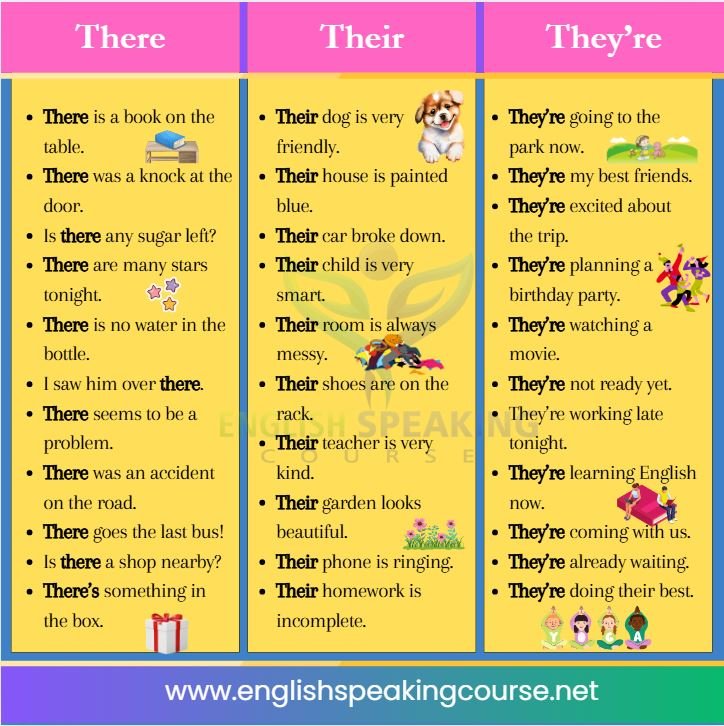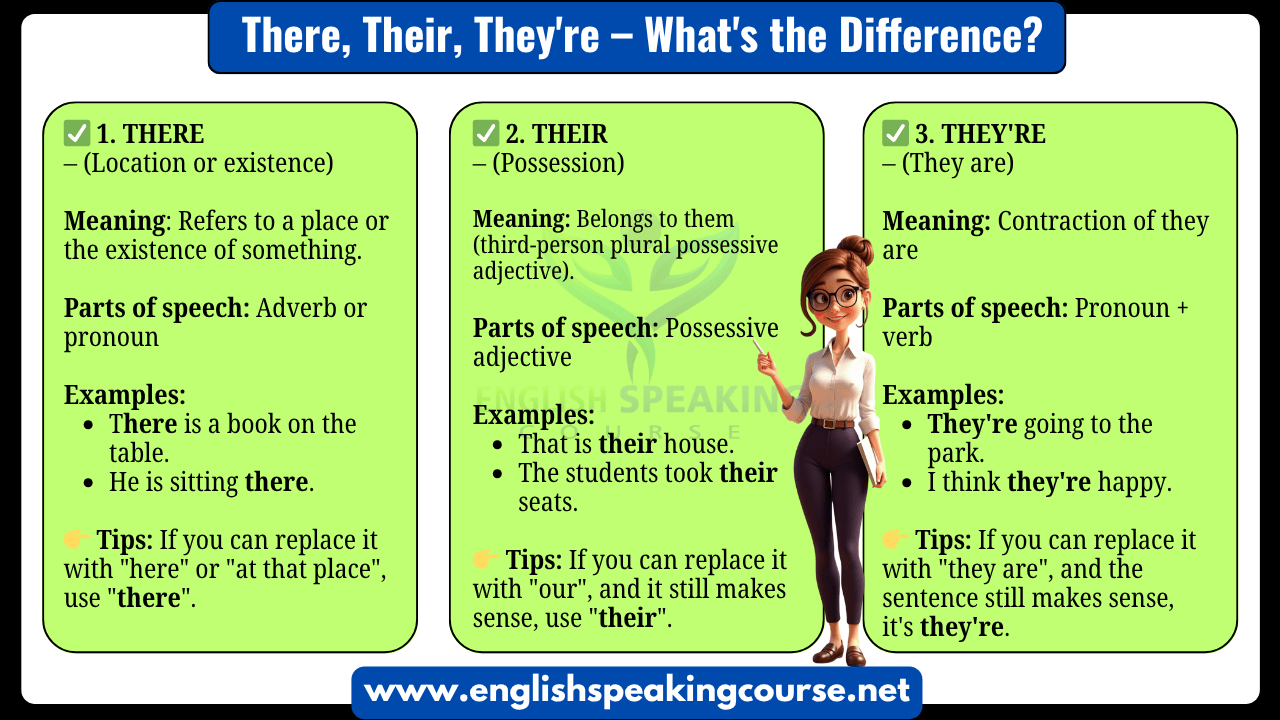Table of Contents
ToggleIntroduction
There, Their, They’re – these three little words sound exactly the same, but they have very different meanings. If you’re confused about when to use each one, you’re not alone! Many English learners (and even native speakers) mix them up all the time.
In this article, we’ll explain the meaning, examples, and difference between there, their, and they’re in a super simple way. You’ll learn how to use each correctly in daily conversations and writing—without any stress!
Whether you’re just starting to learn spoken English or looking to improve your grammar skills, this guide is here to help.
What Does “There” Mean?
The word “there” is usually used to talk about a place or to show that something exists. It’s an adverb or a pronoun, depending on how it’s used in a sentence.
✅ Meaning:
- Refers to a location or direction
- Can also be used to begin a sentence to introduce something
🟢 Examples:
- 📍 There is a book on the table. (something exists)
- 📍 She is standing over there. (a place)
- 📍 There are many people in the room.
🧠 Quick Tip:
If you’re pointing to a place or saying something exists, use “there.”
💡Helpful Tool for Practice:
Want to build better grammar habits? Try using a Spoken English Book for Beginners to practice more examples like this. It’s simple, visual, and great for daily learning.
🪑 Also, if you’re studying at home, a Comfortable Study Chair can help you stay focused longer without hurting your back.

What Does “Their” Mean?
The word “their” is a possessive adjective. That means it shows that something belongs to them (more than one person).
✅ Meaning:
- Used to show ownership or possession
- Describes what “they” have
🟢 Examples:
- 👨👩👧 Their house is very big. (the house belongs to them)
- 📚 The students are reading their books.
- 🐶 Their dog is very friendly.
🧠 Quick Tip:
If you’re talking about something that belongs to someone, use “their.”
💡 Make Learning Easier:
Using visuals and examples daily can really help. A good English Conversation Practice Book can guide you with real-life examples and exercises using “their” and other important words.
📘 Want hands-free study time? Use a Book Holder or Reading Stand so you can read comfortably without holding your book the whole time.
What Does “They’re” Mean?
“They’re” is a contraction, which means it’s a shorter form of two words:
👉 They + are = They’re
So, whenever you can say “they are”, you can use “they’re.”
✅ Meaning:
- A short form of “they are”
- Used to talk about what people are doing or what they are like
🟢 Examples:
- 🎉 They’re going to a party tonight.
- 🍽 They’re eating lunch now.
- 🤗 They’re really happy today.
🧠 Quick Tip:
If you can replace “they’re” with “they are” and the sentence still makes sense — you’re using it right!
🎤 Boost Your Speaking Practice:
Want to improve your spoken English? Try using a Microphone for Speaking Practice to record yourself. Listening back helps you catch small mistakes — like using “they’re” instead of “their.”
🔊 You can also use a Smart Speaker like Alexa to practice by asking and answering questions out loud.
Key Differences Between There, Their, and They’re
Now that you know the meaning of each word, let’s see how they are different from each other. Even though there, their, and they’re sound the same, their spelling, meaning, and use in a sentence are completely different.
📊 Quick Comparison Table:
Word | Type | Meaning | Example |
There | Adverb / Pronoun | Refers to a place or existence | There is a pen on the table. |
Their | Possessive Adjective | Shows ownership | Their car is very fast. |
They’re | Contraction | Short form of “they are” | They’re going to the market. |
🧠 Remember:
- There → Location or existence (Look! There it is!)
- Their → Belonging to them (That’s their house.)
- They’re → They are (They’re very kind people.)
💡 Study Smart Tip:
When comparing similar words, using flashcards or grammar charts can really help. You can use a Laptop Table to set up a mini study station anywhere — perfect for grammar practice time!
🕯 Add a Study Lamp for better focus during evening study sessions. Good lighting = better learning!
How to Remember the Difference Easily
Learning the difference between there, their, and they’re might feel tricky at first—but don’t worry! Here are some simple memory tricks to help you remember them forever:
🔑 Easy Tricks:
- There = Here
➡ Both words end in “-here”
✅ Use “there” when you’re talking about a place.
📍 Example: Look over there!
- Their = Heir
➡ “Heir” is someone who inherits something.
✅ So, use “their” when something belongs to someone.
📚 Example: It’s their book.
- They’re = They are
➡ If you can say “they are” and it makes sense, use “they’re.”
🎉 Example: They’re ready for the trip. = They are ready.
🧠 Practice Idea:
Try writing one sentence a day using all three words.
Example:
✍️ They’re going to their house, which is over there.
📘 Bonus Tip for Beginners:
If you like writing or journaling your practice, use a Desk Organizer to keep your grammar notebooks and pens neat and ready. It makes study time easier and less stressful.
🎧 Want to focus without distractions? Try using Noise-Cancelling Headphones — they’re great for learning in peace, especially when reading or listening to English lessons.
Daily Life Examples for Practice
One of the best ways to remember grammar rules is by seeing how they’re used in real life. Let’s look at some short and simple sentences that use there, their, and they’re — sometimes even in the same sentence!
📝 Real-Life Practice Sentences:
- 🧍♂️ They’re waiting for their friend over there.
→ (They are… / Something belongs to them / A place) - 🐶 Their dog is playing over there, and they’re watching him happily.
→ (Belonging / Location / They are) - 🎒 There is a bag on their desk, but they’re not in the room.
→ (Something exists / Belonging / They are) - 🚗 They’re cleaning their car because there’s dust all over it.
→ (They are / Possession / There is) - 🏡 Their parents are staying there, and they’re visiting tomorrow.
→ (Possession / Location / They are)
💬 Try This:
Make your own examples using all three in one sentence. Say it out loud or write it in your notebook. This will help you speak and write more confidently in English!
📚 Learning Tools That Help:
Want more practice sentences and real conversations? A Spoken English Book for Beginners gives you ready-to-use phrases that you can learn and speak every day.
📱 If you’re on the go, keep a Pair of Earphones with you. Listen to English audio lessons anytime—practice makes perfect!
Common Mistakes to Avoid
Even advanced learners sometimes mix up there, their, and they’re. But don’t worry — once you know what to watch out for, it becomes much easier to avoid these mistakes.
❌ 1. Using “their” when you mean “there”
- ✖ Their is a cat outside.
- ✅ There is a cat outside.
👉 Remember: Use “there” when talking about place or existence.
❌ 2. Using “they’re” when you mean “their”
- ✖ I like they’re new car.
- ✅ I like their new car.
👉 “They’re” = “they are”, so if “they are new car” doesn’t make sense, it’s wrong!
❌ 3. Using “there” instead of “they’re”
- ✖ There going to the mall.
- ✅ They’re going to the mall.
👉 Test by replacing it with “they are” — does it still make sense?
✅ How to Avoid These Mistakes:
- ✅ Say the sentence out loud. Does it sound right?
- ✅ Try replacing “they’re” with “they are.”
- ✅ Ask: Is this about a place? (there), Possession? (their), or “they are”? (they’re)
🧠 Extra Learning Tip:
Use a Reading Stand to keep your grammar book open while doing practice exercises. It helps you read hands-free and stay focused.
🗣 Also, practicing aloud with a Bluetooth Speaker can make your study time fun and interactive. Try reading these mistake examples out loud to hear the difference!
Quiz Time – Test Yourself! 🎯
Now it’s time to test how well you understand the difference between there, their, and they’re. Try to fill in the blanks in the following sentences. Answers are given below — no cheating! 😉
✍️ Fill in the blanks with: there, their, or they’re:
- ___ going to visit ___ cousins who live over ___.
- I think ___ house is the biggest one over ___.
- ___ is a new cafe near ___ school, and ___ planning to try it today.
- The kids are playing with ___ toys while ___ mom waits over ___.
- ___ always forgetting to bring ___ books, even when ___ on time.
✅ Answer Key:
- They’re, their, there
- Their, there
- There, their, they’re
- Their, their, there
- They’re, their, they’re
📚 Tip for Extra Practice:
Want more fun exercises like this? Try using an English Conversation Practice Book — it includes everyday phrases, grammar tips, and quizzes to improve your confidence fast.
💺 Create a quiet study corner with a Comfortable Study Chair — learning is easier when you’re physically comfortable and relaxed.
Helpful Tools & Resources for English Learners
Learning the difference between there, their, and they’re is just one small part of mastering spoken English. To keep improving, you need the right tools and daily practice. Here are some helpful resources to support your learning journey:
📘 1. English Conversation Practice Books
These books are perfect for beginners who want to practice real-life English. They include sample conversations, grammar tips, and daily-use sentences.
👉 Try this beginner-friendly option:
🔗 English Conversation Practice Book
🪑 2. Comfortable Study Setup
Studying in a relaxed environment helps you focus better. Whether you’re reading, writing, or practicing grammar, having a good setup makes a difference.
- 🔗 Comfortable Study Chair
- 🔗 Laptop Table for Flexible Learning
- 🔗 Desk Organizer to keep your materials in order
🔊 3. Audio Learning Tools
Listening is a big part of language learning. Use audio to improve your pronunciation and fluency.
- 🔗 Noise-Cancelling Headphones for distraction-free learning
- 🔗 Smart Speakers (like Alexa) to practice English by asking questions or playing English quizzes
- 🔗 Microphone for Speaking Practice to record and review your spoken English
📝 Pro Tip: Create a daily 30-minute study routine using these tools. Spend 10 minutes reading, 10 minutes writing or speaking, and 10 minutes listening. You’ll notice real improvement in just a few weeks!
Conclusion: Mastering “There,” “Their,” and “They’re”
Let’s quickly recap what we’ve learned:
- ✅ Use “there” when talking about a place or when something exists.
- ✅ Use “their” to show possession — something belongs to them.
- ✅ Use “they’re” when you mean they are — it’s just a shorter way to say it.
Even though these words sound the same, they each play a different role in a sentence. Now that you understand the meaning, examples, and difference, you’re one step closer to writing and speaking English more confidently.
Keep practicing with real-life examples, write your own sentences, and don’t be afraid to make mistakes — that’s how learning happens!
🎯 Recommended for You:
If you want to improve faster, start using tools that support your learning:
📗 Spoken English Book for Beginners – Simple and practical for daily use
🪑 Comfortable Study Chair – Helps you stay focused longer
🎤 Microphone for Speaking Practice – Great for improving pronunciation
These little changes can make a big difference in your journey to fluent English.
FAQs
Q1. What is the main difference between “their” and “they’re”?
Answer:
“Their” is a possessive adjective showing ownership (e.g., their car), while “they’re” is a contraction of they are (e.g., they’re happy).
Q2. Can I use “there” for people?
Answer:
Yes, but only when referring to someone’s location, not as a replacement for a person. Example: He is over there.
Q3. Why is “they’re” considered informal?
Answer:
Because it is a contraction of they are. Contractions are generally used in spoken or casual writing, not in formal contexts.
Q4. Is it okay to use “they’re” in academic writing?
Answer:
It’s better to avoid contractions like they’re in academic writing. Use the full form they are for formality and clarity.
Q5. What are some fun ways to practice these words?
Answer:
Try grammar games, flashcards, quizzes, or write short stories using “there,” “their,” and “they’re” correctly. You can also test yourself with fill-in-the-blank exercises.




